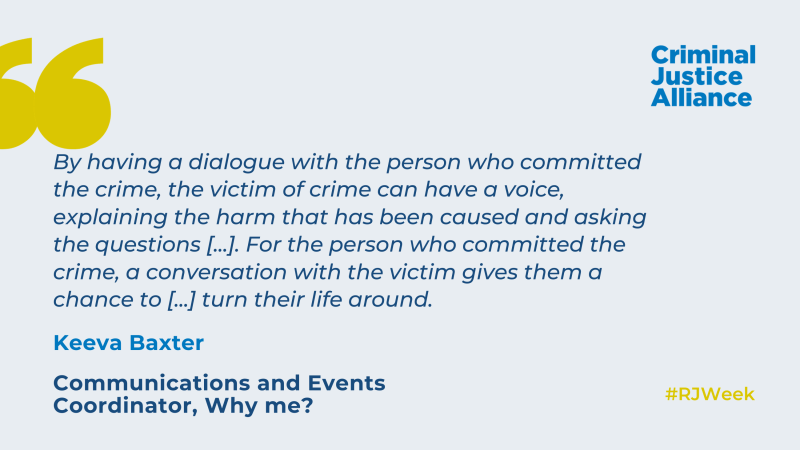This week is International Restorative Justice Week 2023. This is a blog by Keeva Baxter, Communications and Events Coordinator at Why me?, a national charity which promotes and delivers Restorative Justice. In this blog, Keeva explores what Restorative Justice is and why it is used, sharing details of Why me?’s new podcast, Restorative Talks.

When someone experiences a crime, it can have an enormous impact on their day-to-day life. Often left with unanswered questions about why it happened, people affected by crime can experience anxiety, insomnia or a fear that it will happen again and often want to ensure that it won’t happen to anyone else. When going through the Criminal Justice System, many victims of crime also feel that their voice has not been heard. Without having a chance to explain the impact the crime had on their life, they may feel silenced and retraumatised.
When someone commits a crime, they may feel like they haven’t had the chance to apologise, make amends or explain why they did it. They may also be in a unique position to answer the victim of crime’s questions.
“You put yourself in their position, they must have had a lot of questions and stuff going around in their heads, ‘who, why, what?’. So you just think, if it was me I’d want to know what happened. I just felt that it was the right thing to do.”
David, explaining his decision to take part in Restorative Justice following a 15 year prison sentence for murder.
But, there is a way to solve some of these problems and help people affected by crime to recover and move on. By having a dialogue with the person who committed the crime, the victim of crime can have a voice, explaining the harm that has been caused and asking the questions that have been on their mind. For the person who committed the crime, a conversation with the victim gives them a chance to make amends for what they did, understand the consequences of their actions and turn their life around.
This is called Restorative Justice.
Restorative Justice is where someone harmed by crime has a dialogue with the person that harmed them. This can take place in a face to face meeting, or an indirect method such as letters, a shuttle process or a conversation with an expert. The entire process is supported by a trained professional who will speak to both parties individually before a meeting takes place, ensuring it is safe to go ahead. Restorative Justice can support people affected by any type of crime, including theft, murder, domestic abuse and hate crime.
This Restorative Justice Week, Why me? have published a brand new podcast series, Restorative Talks, which explores what Restorative Justice is, how it works and why people affected by crime want to take part.
In episodes 2 and 3 of Restorative Talks, Why me? speak directly to Janika who was stabbed by her ex-partner and found closure through meeting him in a restorative meeting.
“I wanted him to be accountable to me – not to a judge, not to the police, not to prison officers but to me. I felt my voice wasn’t being heard… I wanted to tell him the impact his actions had on me, my children, my family and my friends. I wanted to face my fear…I wanted to see he understood the impact of his actions and what he had lost.”
We encourage you to listen to the podcast and share it with your networks to help spread the word about Restorative Justice this #RJWeek, allowing more people affected by crime to access the support they need to move on.
All episodes of Restorative Talks are now available to stream on Spotify.



